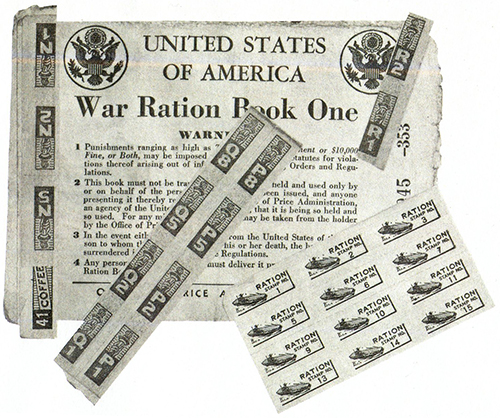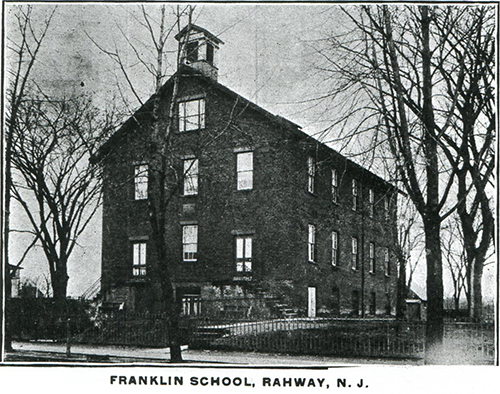By Al Shipley, City Historian and Rahway Library Research Consultant
It’s a new year and time to look back at what was going on in the City of Rahway 50, 75, and 100 years ago as reported in the pages of the local paper of the day.
1917
The year began with the announcement that the evangelist Charles F. Weigle, a well–known and gifted orator from Kentucky, was coming to Rahway for a six-week evangelistic campaign to rekindle the spirits of Rahway’s Christians. During his visit, several massive revival meetings were held in a tented tabernacle which was constructed in an open lot on the corner of Campbell Street and Elm Avenue. It was estimated that over 1,730 persons were “born again” and made ready to “hit the trail” for Christ.
The Board of Education reported that Franklin School, located on Union Street and built in 1852, was over-crowded and outdated (a new Franklin School would eventually be built on St. Georges Avenue in 1922.) It was also in 1917 that schools were fire-proofed and fire escapes were added.
The Merck plant completed a three-year construction project that tripled the number of buildings and employees on their 200 acre site. Established in 1899, Merck had developed into the largest manufacturing concern in the city producing over 5,000 different products.
The United States entered World War I on April 6 and Rahway responded by requiring families to complete a survey listing the names of each man in the family of military age and all material resources owned such as guns, autos, and anything else that might be of use in the war effort.
On October 26 the Post Office celebrated the 20th anniversary of their home delivery service. In December, the library announced that as of February 1918, it would become a free public library, making the borrowing of books and magazines free to all residents of the city. (Paid subscriptions were required for membership before this change.)
1942
Throughout 1942, assisting in the war effort and preparing for the possibility of an invasion dominated the attention of cities across the nation. In Rahway, air raid sirens were installed atop city hall, the high school, Grover Cleveland, Franklin, and Roosevelt schools. The alert signal was a series of short blasts over a two minute period and the all clear signal was a two-minute continuous blast of steady pitch.
On Wednesday, April 15, the first blackout drill was held from 10:00-10:15 p.m. in nine counties in north Jersey. All vehicular traffic was stopped and all lights extinguished. The response in Rahway was almost perfect.
Paper, rags, cardboard, metals, rubber, and tin cans were collected in scrap drives. Ration cards were issued for sugar, gasoline, and fuel oil. Auto purchases were controlled and driving mileage recorded. War stamps and bonds were purchased by students in each of the schools and bonds were sold in churches, factories, theaters, and the hospital.
In August, Regina was awarded the prestigious Army–Navy E Award for converting their production line to produce materials for the war. National Pneumatic received the E Award in September and Merck would be honored with the award in January, 1943.
Rules were set for Christmas lighting. Only modest lighting could be displayed on homes with no extravagant use of lights that could contribute to the overall sky glow.
News came in November that Marine Pvt. Terrance J. Brady died from wounds while fighting in the battles of the South Pacific, thus becoming the first Rahway boy to be killed in action in World War II.
1967
Seventeen candidates ran for seats on the Board of Education which remains the largest slate to run since the board became an elective body in the 1950s. The new board would enact several issues that would become controversial including a plan to transfer 5th and 6th graders from Grover Cleveland and Columbian elementary schools to Madison and Roosevelt as a step in reducing racial imbalance in the grammar schools. A second “hot button” item was the board’s decision to introduce courses in Family Life and Sex Education to the high school curriculum.
On Saturday, May 13, American Legion Post 5 chartered buses to take residents to New York City to participate in a parade along 5th Avenue to support the boys fighting in Viet Nam.
Herbert T. Kinch was appointed Chief of Police to become the first African-American to command a large city police force in North Jersey. Kinch joined the force in 1942 and rose through the ranks. He had been named Deputy Police Chief in 1965.
The old library on Seminary Avenue and Irving Street closed on June 26. The grand opening of the new St. Georges Avenue library was celebrated on July 16.

(above) Food staples and commodities vital to the war effort had to be rationed. All residents were issued ration books by the Office of Price Administration.

(above) The original Franklin School was on Union Street between Church and Ludlow.

(above) The St. Georges Avenue Library, opened in 1967, served the public for only 22 years. The building was destroyed in the Fall of 1999 by the flood waters of Hurricane Floyd.

